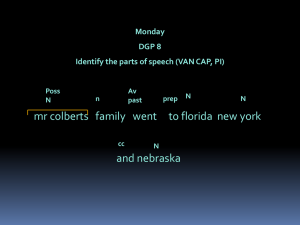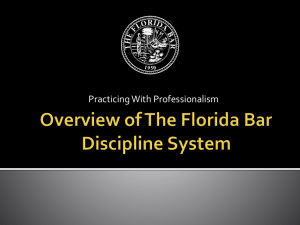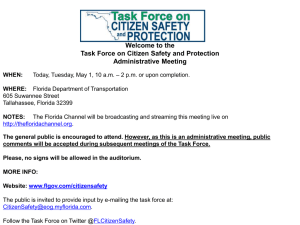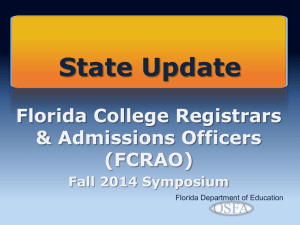Florida State University College of Law Research Center
advertisement
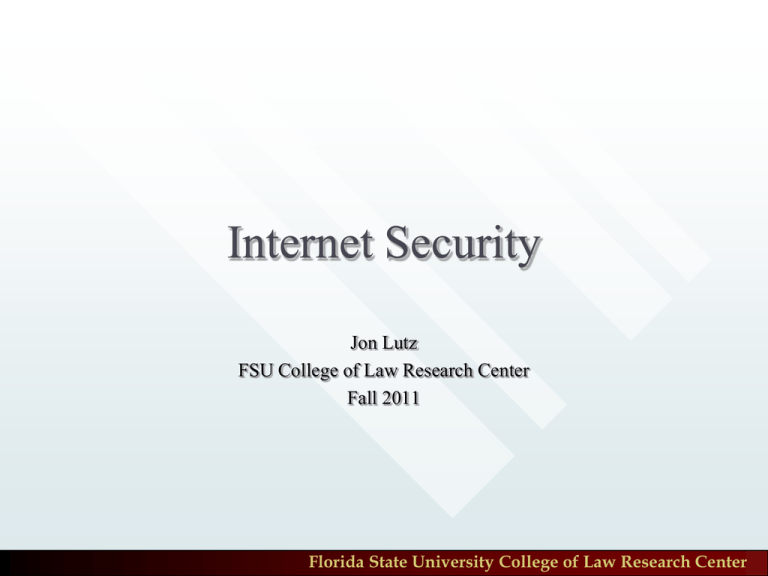
Internet Security Jon Lutz FSU College of Law Research Center Fall 2011 Florida State University College of Law Research Center Antivirus • Free for Windows • AVIRA http://www.avira.com/en/avira-free-antivirus • AVG http://free.avg.com/us-en/homepage • Avast http://www.avast.com/en-us/index • Windows Security Essentials http://www.microsoft.com/enus/security_essentials/default.aspx • Mac • Sophos http://www.sophos.com/en-us/products/freetools/sophos-antivirus-for-mac-home-edition.aspx Florida State University College of Law Research Center Rogue Security software Florida State University College of Law Research Center Malware • Malwarebytes http://www.malwarebytes.org/ Florida State University College of Law Research Center iPhone Siri Security Flaw • Siri can be used on the new iPhone 4S even when it’s locked. This would allow anybody to pickup your found and send messages to your contacts. • Change default setting: Allow access to Siri when locked with a passcode to Off. http://www.huffingtonpost.com/2011/10/20/siri-security-iphone-4s_n_1022194.html Florida State University College of Law Research Center Android Ice Cream Sandwich Security Flaw • Face unlock feature will unlock the phone when it recognizes a users face • Security flaw: pictures work too Florida State University College of Law Research Center Find My iPhone Florida State University College of Law Research Center Android Lost Florida State University College of Law Research Center Tips for Removing Metadata from MS Word Files • What can be in metadata • • • • • • Shared Authors Comments Document revisions Hidden Text Tracked changes Undo/redo history Florida State University College of Law Research Center Tips for Removing Metadata from Word Files • • • • Convert to RTF Scan the file and convert to image or PDF Print to PDF (doesn’t get rid of everything) Microsoft Prepare/Inspect Document Florida State University College of Law Research Center Duqu Threat http://www.symantec.com/connect/w32-duqu_status-updates_installer-zero-day-exploit Florida State University College of Law Research Center What do you have on the Web Caption: “Drunken Pirate” Florida State University College of Law Research Center Court Rules Against http://www.msnbc.msn.com/id/18372103/#.Tp84XZuIk9o Florida State University College of Law Research Center Minnesota Court of Appeals http://minnesota.publicradio.org/collections/special/columns/news_cut/archive/2011/07/ court_of_appeals_facebook_post.shtml Florida State University College of Law Research Center Twitter Florida State University College of Law Research Center What’s Your Web Identity Florida State University College of Law Research Center How can you find out? • Spokeo • http://www.spokeo.com/ Florida State University College of Law Research Center Spokeo Florida State University College of Law Research Center Florida State University College of Law Research Center Florida State University College of Law Research Center Florida State University College of Law Research Center Florida State University College of Law Research Center Google Dashboard From the Profile and Privacy page: Florida State University College of Law Research Center Google Dashboard Florida State University College of Law Research Center Google Security Florida State University College of Law Research Center Google Personal Information http://www.google.com/support/webmasters/bi n/answer.py?answer=164133 Florida State University College of Law Research Center Mugged in Spain • Hacked by James Fallows • http://www.theatlantic.com/magazin e/archive/2011/11/hacked/8673/ Florida State University College of Law Research Center Google 2-Step Verification http://googleblog.blogspot.com/2011/02/advanced-sign-in-security-for-your.html Florida State University College of Law Research Center Facebook Florida State University College of Law Research Center Facebook Privacy Florida State University College of Law Research Center Facebook Security Florida State University College of Law Research Center Facebook Florida State University College of Law Research Center Facebook Apps Florida State University College of Law Research Center Apps Florida State University College of Law Research Center Facebook Apps Florida State University College of Law Research Center Facebook Security Settings Florida State University College of Law Research Center Facebook Security Florida State University College of Law Research Center Login Approvals Florida State University College of Law Research Center Facebook Activity Florida State University College of Law Research Center Facebook Security • Stop • Think • Connect • http://www.facebook.com/security?v=wall Florida State University College of Law Research Center Facebook Security by Sophos • Facebook Security Best Practices • http://www.sophos.com/en-us/security-newstrends/best-practices/facebook.aspx Florida State University College of Law Research Center Facebook Security by Sophos • Facebook Security Best Practices • http://www.sophos.com/e n-us/security-newstrends/bestpractices/facebook/accou nt-settings.aspx Florida State University College of Law Research Center Cloud Computing Florida • • This committee concludes that the main consideration in file storage is that the appropriate documents be maintained, not necessarily the method by which they are stored. Therefore, a law firm may store files electronically unless: a statute or rule requires retention of an original document, the original document is the property of the client, or destruction of a paper document adversely affects the client’s interests. The committee agrees with other jurisdictions that have noted practical considerations involved in electronic file storage. The committee cautions lawyers that electronic files must be readily reproducible and protected from inadvertent modification, degradation or destruction. The lawyer may charge reasonable copying charges for producing copies of documents for clients as noted in Florida Ethics Opinion 88-11 Reconsideration. Finally, lawyers must take reasonable precautions to ensure confidentiality of client information, particularly if the lawyer relies on third parties to convert and store paper documents to electronic records. Rule 4-1.6, Rules of Professional Conduct. From Professional Ethics of the Florida Bar – Opinion 06-1 ( April10, 2006) [Revised: 09-08-2011] http://www.floridabar.org/tfb/TFBETOpin.nsf/b2b76d49e9fd64a5852570050067a7af/9d 8c4cf77b6a54278525718f005ab400!OpenDocument Florida College of Law Research Center FloridaState StateUniversity University College of Law Research Center North Carolina 2010 Formal Ethics Opinion • Proposed 2010 Formal Ethics Opinion 7 Subscribing to Software as a Service While Fulfilling the Duties of Confidentiality and Preservation of Client Property April 15, 2010 http://www.ncbar.gov/ethics/propeth.asp Florida College of Law Research Center FloridaState StateUniversity University College of Law Research Center Proposed opinion rules that a law firm may contract with a vendor of software as a service provided the risks that confidential client information may be disclosed or lost are effectively minimized. Inquiry #1: Much of software development, including the specialized software used by lawyers for case/practice management, document management, and billing/financial management, is moving to the "software as a service" (SaaS) model. In the article "Software as a Service (SaaS) Definition and Solutions," Meridith Levinson, writing for the CIO website, explains SaaS as follows: Generally speaking, it's software that's developed and hosted by the SaaS vendor and which the end user customer accesses over the Internet. Unlike traditional packaged applications that users install on their computers or servers, the SaaS vendor owns the software and runs it on computers in its data center. The customer does not own the software but effectively rents it, usually for a monthly fee.1 The American Bar Association's Legal Technology Resource Center explains SaaS as follows: SaaS is distinguished from traditional software in several ways. Rather than installing the software to your computer or the firm's server, SaaS is accessed via a web browser (like Internet Explorer or FireFox) over the Internet. Data is stored in the vendor's data center rather than on the firm's computers. Upgrades and updates, both major and minor, are rolled out continuously. And perhaps most importantly, SaaS is usually sold on a subscription model, meaning that users pay a monthly fee rather than purchasing a license up front.2 SaaS for law firms may involve the storage of a law firm's data, including client files, billing information, and work product, on remote servers rather than on the law firm's own computer and, therefore, outside the direct control of the firm's lawyers. Given the duty to safeguard confidential client information, including protecting that information from unauthorized disclosure; the duty to protect client property from destruction, degradation, or loss (whether from system failure, natural disaster, or dissolution of a vendor's business); and the continuing need to retrieve client data in a form that is usable outside of the vendor's product;4 may a law firm use SaaS? Florida College of Law Research Center FloridaState StateUniversity University College of Law Research Center Yes, provided steps are taken effectively to minimize the risk of inadvertent or unauthorized disclosure of confidential client information and to protect client property, including file information, from risk of loss. Rule 1.6 of the Rules of Professional Conduct states that a lawyer may not reveal information relating to the representation of a client unless the client gives informed consent or the disclosure is impliedly authorized to carry out the representation. Comment [17] explains, "A lawyer must act competently to safeguard information relating to the representation of a client against inadvertent or unauthorized disclosure by the lawyer or other persons who are participating in the representation of the client or who are subject to the lawyer's supervision." Comment [18] adds that, when transmitting confidential client information, a lawyer must take "reasonable precautions to prevent the information from coming into the hands of unintended recipients." Rule 1.15 also requires a lawyer to preserve client property, including information in a client's file such as client documents and lawyer work product, from risk of loss due to destruction, degradation, or loss. See also RPC 209 (noting the "general fiduciary duty to safeguard the property of a client"); RPC 234 (duty to store original documents with legal significance in a safe place or return to client); and 98 FEO 15 (lawyer must exercise "due care" when selecting depository bank for trust account). Although a lawyer has a professional obligation to protect confidential information from unauthorized disclosure, the Ethics Committee has long held that this duty does not compel any particular mode of handling confidential information nor does it prohibit the employment of vendors whose services may involve the handling of documents or data containing client information. See RPC 133 (no requirement that firm's waste paper be shredded if lawyer ascertains that persons or entities responsible for the disposal employ procedures that effectively minimize the risk that confidential information may be disclosed). Moreover, the committee has held that, while the duty of confidentiality extends to the use of technology to communicate, "this obligation does not require that a lawyer use only infallibly secure methods of communication." RPC 215. Rather, the lawyer must use reasonable care to select a mode of communication that, in light of the circumstances, will best protect confidential communications and the lawyer must advise affected parties if there is reason to believe that the chosen communications technology presents an unreasonable risk to confidentiality. Id. Florida College of Law Research Center FloridaState StateUniversity University College of Law Research Center Furthermore, in 2008 FEO 5, the committee has already held that the use of a web-based document management system that allows both the law firm and the client access to the client's file is permissible: provided the lawyer can fulfill his obligation to protect the confidential information of all clients. A lawyer must take steps to minimize the risk that confidential client information will be disclosed to other clients or to third parties. See RPC 133 and RPC 21585A security code access procedure that only allows a client to access its own confidential information would be an appropriate measure to protect confidential client information85If the law firm will be contracting with a third party to maintain the web-based management system, the law firm must ensure that the third party also employs measures which effectively minimize the risk that confidential information might be lost or disclosed. See RPC 133. In a recent ethics opinion, the Arizona State Bar's Committee on the Rules of Professional Conduct concurred with 2008 FEO 5 by holding that a law firm may use an online file storage and retrieval system that allows clients to access their files over the internet provided the firm takes reasonable precautions to protect the security and confidentiality of client documents and information.4 In light of the above, the Ethics Committee concludes that a law firm may use SaaS if reasonable care is taken effectively to minimize the risks to the confidentiality and to the security of client information and client files. However, the law firm is not required to guarantee that the system will be invulnerable to unauthorized access.5 Note that no opinion is expressed on the business question of whether SaaS is suitable for a particular law firm. Florida College of Law Research Center FloridaState StateUniversity University College of Law Research Center Inquiry #2: Are there any "best practices" that a law firm should follow when contracting with a SaaS vendor to minimize the risk? Software as a Service Florida College of Law Research Center FloridaState StateUniversity University College of Law Research Center Yes, a lawyer should be able to answer the list of questions below satisfactorily in order to conclude that the risk has been minimized. However, the list is not all-inclusive and consultation with a security professional competent in the area of online computer security is recommended when contracting with a SaaS vendor. Moreover, given the rapidity with which computer technology changes, what may constitute reasonable care may change over time and a law firm would be wise periodically to consult with such a professional. The lawyer or law firm should be able to answer the following questions sufficiently to conclude that the risk to confidentiality and security of client file information is minimal:6 Florida College of Law Research Center FloridaState StateUniversity University College of Law Research Center 1. What is the history of the SaaS vendor? Where does it derive funding? How stable is it financially? 2. Has the lawyer read the user or license agreement terms, including the security policy, and does he/she understand the meaning of the terms? 3. Does the SaaS vendor's Terms of Service or Service Level Agreement address confidentiality? If not, would the vendor be willing to sign a confidentiality agreement in keeping with the lawyer's professional responsibilities? Would the vendor be willing to include a provision in that agreement stating that the employees at the vendor's data center are agents of the law firm and have a fiduciary responsibility to protect client information? 4. How does the SaaS vendor, or any third party data hosting company, safeguard the physical and electronic security and confidentiality of stored data? Has there been an evaluation of the vendor's security measures including the following: firewalls, encryption techniques, socket security features, and intrusion-detection systems? 5. Has the lawyer requested copies of the SaaS vendor's security audits? 6. Where is data hosted? Is it in a country with less rigorous protections against unlawful search and seizure? 7. Who has access to the data besides the lawyer? 8. Who owns the data—the lawyer or SaaS vendor? 9. If the lawyer terminates use of the SaaS product, or the service otherwise has a break in continuity, how does the lawyer retrieve the data and what happens to the data hosted by the service provider? 10. If the SaaS vendor goes out of business, will the lawyer have access to the data and the software or source code? 11. Can the lawyer get data "off" the servers for the lawyer's own offline use/backup? If the lawyer decides to cancel the subscription to SaaS, will the lawyer get the data? Is data supplied in a non-proprietary format that is compatible with other software? 12. How often is the user's data backed up? Does the vendor back up data in multiple data centers in different geographic locations to safeguard against natural disaster? 13. If clients have access to shared documents, are they aware of the confidentiality risks of showing the information to others? See 2008 FEO 5. 14. Does the law firm have a back-up for shared document software in case something goes wrong, such as an outside server going down? Florida College of Law Research Center FloridaState StateUniversity University College of Law Research Center Why Use Cloud Computing • • • • • • • Client Independent Lower Cost Skilled Resources Disaster Recovery Improved Network Access Better Application Development Tools Better Security !! Florida State University College of Law Research Center Better Security • Major Cloud Services hire the best of the best • Distributed data safe from a local disaster • Employees accessing info from the cloud better than having sensitive data on a laptop • The leading cyber organization in the U.S. Military, the U.S. Cyber Command advocates migration to the cloud to improve security • http://www.stratcom.mil/factsheets/Cyber_Command/ Florida State University College of Law Research Center Cloud Concerns • Exposure of authentication interface • Unclear trust boundaries • Data segregation • Isolation failures • Shared encryption keys • Data mobility • Could reside in a different country • What are their privacy laws • Government seizure of data Florida State University College of Law Research Center Cloud Concerns • Increased consolidation • Mirroring • Multiple copies may exist • This is good for retention but may be bad in accounting for all copies, deleting Florida State University College of Law Research Center Cloud Computing and Privacy • Legally Privileged Information • Third party access • Loss of confidentiality • Bankruptcy of CSP • Private data may be sold • Mergers or acquisitions may require disclosure of information for due diligence Florida State University College of Law Research Center Cloud Computing and Privacy • Legal Seizures • May also seize private information of co-tenants • Compelled disclosures • Consumer privacy Florida State University College of Law Research Center eDiscovery • Information Management • Records retention/destruction policies • Identification • CSP employee will probably participate in finding data • Preservation • Who’s liable for loss of information • Collection Florida State University College of Law Research Center eDiscovery • Presentation • Is data in the possession and control of the organization or the CSP • Metadata and log data • Can a CSP be compelled to produce data from an organization without their consent? • Under the Stored Communications Act content should not be provided to a third party. • CSP might not be bound to answer discovery questions • But the organization should know how they will respond to discovery request. Florida State University College of Law Research Center Cloud Computing for Lawyers and Executives http://www.amazon.com/Cloud-ComputingLawyers-Executives-Approach/dp/0615487238/ Florida State University College of Law Research Center eDiscovery for Dummies http://blog.sonian.com/bid/56118/eDiscovery-for-Dummies-What-You-Need-to-Know Florida State University College of Law Research Center http://www.kazeon.com/solutions2/legal-discovery.php Florida State University College of Law Research Center

